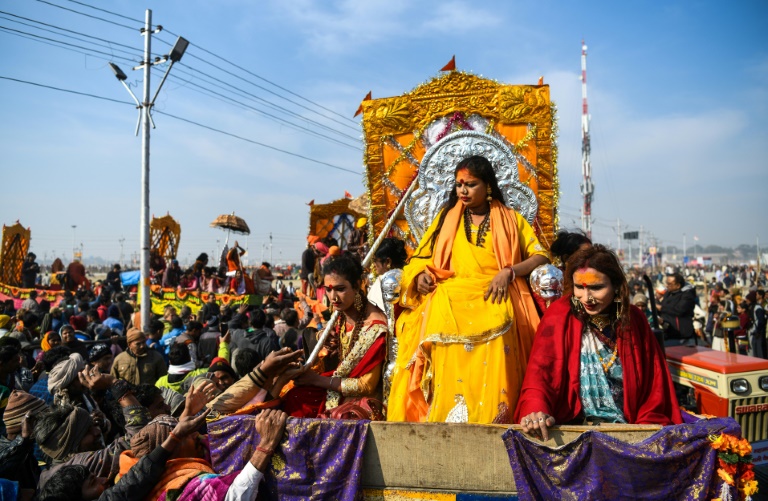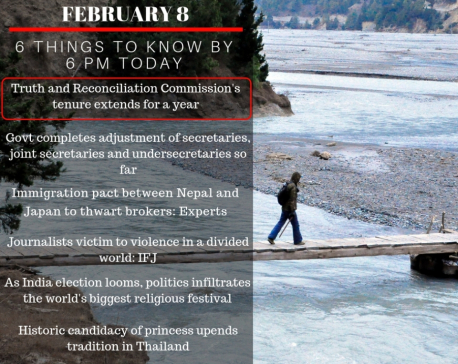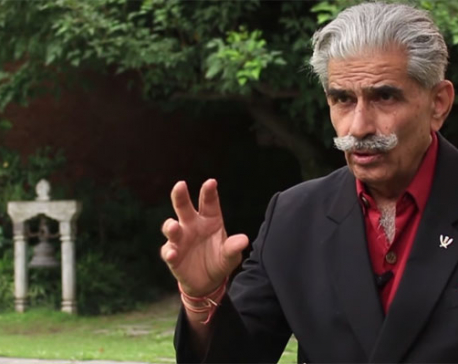
OR
India's transgenders take first Kumbh Mela dip
Published On: January 16, 2019 03:00 PM NPT By: AFP/RSS

NEW DELHI, Jan 16: For decades Laxmi Narayan Tripathi has fought India's conservative laws and beliefs to put her transgender community on a par with the rest of society, and now she has notched up a new milestone.
On Tuesday she and dozens of other resplendent "Kinnars" splashed in the sacred waters of the Ganges and Yamuna rivers alongside revered Hindu ascetics at the immense Kumbh Mela festival in northern India.
It was the first time that members of India's estimated two-million-strong transgender community have been allowed to do so at the festival, the biggest religious gathering in the world that got under way this week.
Dressed in saffron and red saris, they reached the river banks to take the ritual bath that Hindus believe will rid them of their sins, as devotees chanted religious hymns and thousands of people looked on.
"For us, this participation is about mainstream society accepting us. The creator is within us and once we die, we will go back to him. Our doors are open for all," Tripathi told reporters last week.
Hijras, a term used in India for transgenders and eunuchs, often live on the extreme fringes of society, with many forced into prostitution, begging or menial jobs.
But Hinduism has many references to transgenders, including gods and goddesses who belong to the third gender.
Over the centuries transgenders have assumed different roles in society, from royal courtesans to participants in birth ceremonies and other auspicious occasions.
They have waged a lengthy battle to protect their rights and end discrimination.
India's Supreme Court recognised them as a third gender in a historic 2014 ruling, followed by a judgement last year that overturned a colonial-era law criminalising gay sex.
Tripathi, 40, heads Kinnar Akhara, a religious gymnasium or monastery for Sadhus or ascetics. It has however not yet won official recognition from the other groups.
"Establishing Kinnar Akhara aims to show the correct path to the next generation and to ensure that they do not face the stigma and discrimination we faced," Pavitra Nimbhorker, the group's secretary, told AFP.
The Kumbh Mela, which began on Tuesday, is expected to attract more than 100 million Hindus over the coming seven weeks to bathe at the confluence of the Ganges, Yamuna and mythical Saraswati rivers.
You May Like This

Feb 8: 6 things to know by 6 PM
Your daily dose of missed important news of the day. ... Read More...

India asks states to allow transgender choice in bathrooms
NEW DELHI, April 6: India's government has asked all states to let transgender people use any public toilet of their choice. ... Read More...

China outrunning India in Nepali politics, India mulling a new strategy
With an unprecedented activeness of China, India seems preparing to counter it. India's Nepal Affairs expert and retired Indian Army... Read More...







Just In
- Health ministry to conduct ‘search and vaccinate’ campaign on May 13
- Indian customs releases trucks carrying Nepali tea, halted across Kakarbhitta
- Silent period for by-election to begin from midnight
- SC issues short-term interim order to govt and TU not to take immediate action against TU legal advisor Khanal
- National consultation workshop advocates to scale up nutrition smart community in Nepal
- Patan High Court issues short-term interim order to halt selection process of NTB’s CEO
- NEPSE inches up 0.15 points; daily turnover increases to Rs 2.53 billion
- Bagmati Govt mandates tri-lingual signboards in offices











Leave A Comment